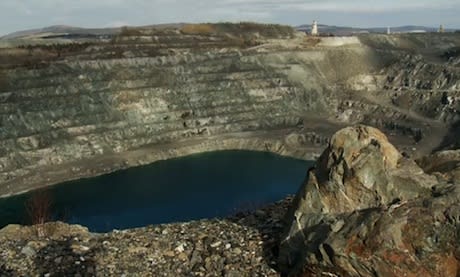Generally speaking, documentaries are intended to observe and document without prejudice, allowing the topic and its subjects to flow organically, unfolding before our eyes. When documenting a political activism theme, it is paramount for the director to present all sides of the argument without personally interfering; ideally not using dramatics and manipulative tactics to prove a point should they want to be taken seriously as a filmmaker.
In the case of Danielle Heifa's Canary in the Mine, this concept of remaining unbiased, or handling a subject maturely, was thrown out the window in favour of 33 minutes of the most unscrupulous one-sided, puerile tripe I have ever had the misfortune of viewing.
The film opens with a site tour of the Thetford Mines in Quebec, led by an obvious asbestos-supporter. He gives a very brief explanation of the facilities and even (gasp!) holds a piece of asbestos in his hands and sniffs it. The person behind the camera is heard asking the gentleman, "Do people exaggerate the health effects?" He responds, "Yeah, a lot." It is this point that divides the (very) limited audience: either you're shocked by his response, or appalled by the blatantly manipulative agenda tactic.
The rest of the film is flooded with interviews of sobbing women, literally labelled "asbestos widows," discussing the effects of long-term exposure on their loved ones while working in the asbestos mines, production facilities and even in a Canadian Naval ship.
While the interviews with the women are the core of the film, there's also a segment from the "Jon Stewart Show" and the "Rick Mercer Report" that aim to supply comic relief, addressing the absurdity of Canada's continued chrysotile asbestos mining. Paired with these comedic clips is archival footage of 1950s pro-asbestos propaganda once used to promote the use and production of the material. This strained juxtaposition seeks to shock the audience through past ideological audacity, conveniently ignoring a pesky little thing called context.
The real crux of this film is the arguments against the Canadian government and, more to the point, Prime Minister Stephen Harper and the Conservative Party of Canada. Countless defamatory statements are thrown out without substantiation, bordering on libel. Amusingly, Ryerson student Danielle Reifa has taken the tragedies of her documentary subjects and exploited them to further her own solipsistic political agenda, which is ironically the only shocking and audacious thing about this poorly executed mess.
To be fair, there is plenty of evidence that shows asbestos is a toxin that shouldn't even exist, which, in itself, justifies scrutiny. There's also much to be said about the fact that asbestos is labelled as a hazardous material here in Canada, yet it is still exported abroad to developing and third world countries without label. It's just a shame that the director of Canary in the Mine was unable to provide any semblance of balance, focus or maturity in presenting her argument.
Heifa does make mention that all requests for interviews or involvement in her documentary were rejected but after seeing how her film unfolded, it's no wonder why no one wanted to comment.
(Caritaps)In the case of Danielle Heifa's Canary in the Mine, this concept of remaining unbiased, or handling a subject maturely, was thrown out the window in favour of 33 minutes of the most unscrupulous one-sided, puerile tripe I have ever had the misfortune of viewing.
The film opens with a site tour of the Thetford Mines in Quebec, led by an obvious asbestos-supporter. He gives a very brief explanation of the facilities and even (gasp!) holds a piece of asbestos in his hands and sniffs it. The person behind the camera is heard asking the gentleman, "Do people exaggerate the health effects?" He responds, "Yeah, a lot." It is this point that divides the (very) limited audience: either you're shocked by his response, or appalled by the blatantly manipulative agenda tactic.
The rest of the film is flooded with interviews of sobbing women, literally labelled "asbestos widows," discussing the effects of long-term exposure on their loved ones while working in the asbestos mines, production facilities and even in a Canadian Naval ship.
While the interviews with the women are the core of the film, there's also a segment from the "Jon Stewart Show" and the "Rick Mercer Report" that aim to supply comic relief, addressing the absurdity of Canada's continued chrysotile asbestos mining. Paired with these comedic clips is archival footage of 1950s pro-asbestos propaganda once used to promote the use and production of the material. This strained juxtaposition seeks to shock the audience through past ideological audacity, conveniently ignoring a pesky little thing called context.
The real crux of this film is the arguments against the Canadian government and, more to the point, Prime Minister Stephen Harper and the Conservative Party of Canada. Countless defamatory statements are thrown out without substantiation, bordering on libel. Amusingly, Ryerson student Danielle Reifa has taken the tragedies of her documentary subjects and exploited them to further her own solipsistic political agenda, which is ironically the only shocking and audacious thing about this poorly executed mess.
To be fair, there is plenty of evidence that shows asbestos is a toxin that shouldn't even exist, which, in itself, justifies scrutiny. There's also much to be said about the fact that asbestos is labelled as a hazardous material here in Canada, yet it is still exported abroad to developing and third world countries without label. It's just a shame that the director of Canary in the Mine was unable to provide any semblance of balance, focus or maturity in presenting her argument.
Heifa does make mention that all requests for interviews or involvement in her documentary were rejected but after seeing how her film unfolded, it's no wonder why no one wanted to comment.




